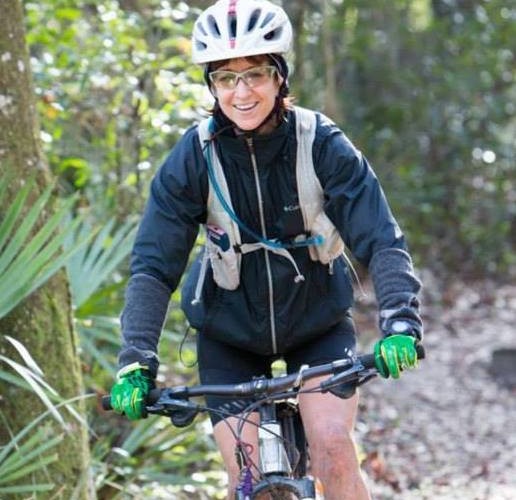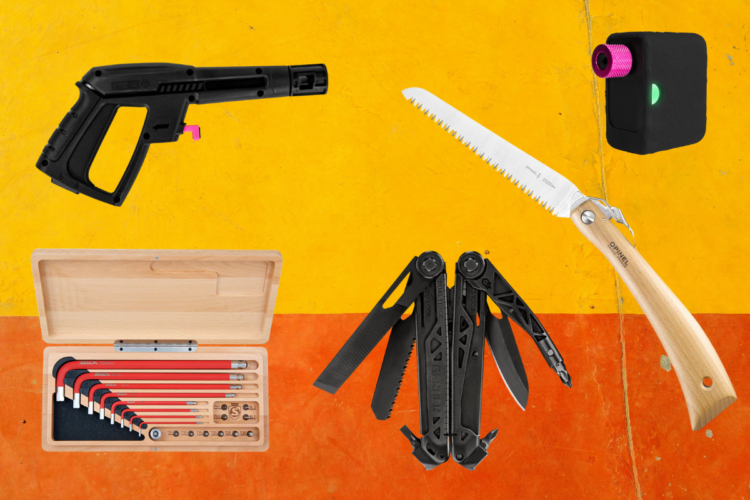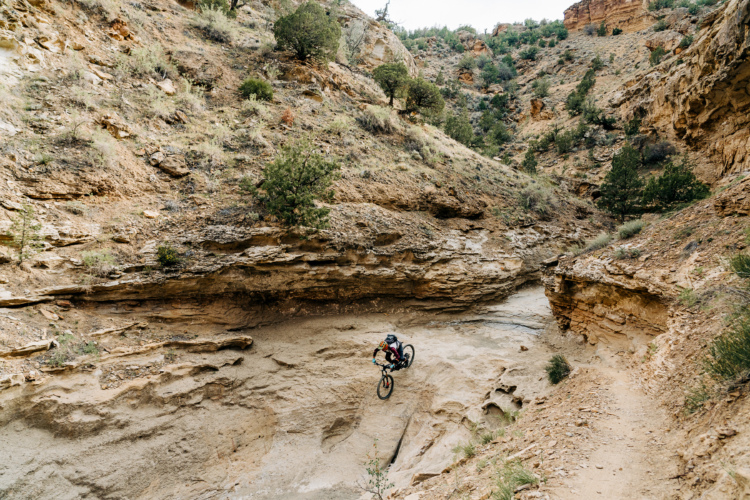
Sunshine, flowy trails, the promise of post-ride beers, and a fun group of riding buddies: mountain bikers look forward to this every week. But unlike Brooke Goudy and her friends, most mountain bikers aren’t usually also subject to blatant stares as we pass by.
Sure, each of the seven women riding that day did so on enviable bikes and were kitted out in great gear, but that’s not what caught the eyes of fellow trail users, says Goudy.
“People stare because I don’t think they see very many Black women mountain biking,” Goudy said.
“Usually when I’m out there, I’m the only Black woman. But [last month’s group ride] was the first time I felt pride when people were staring at me — as part of this group. And oh my gosh, my heart. So full.”
The Great (White) Outdoors
Originally from Montgomery, Alabama, Goudy moved to Denver for an internship 17-years-ago and was thrown into the outdoor scene which makes up so much of the social fabric in the Mile High City.
“If you want a beer in Colorado, you usually go for a bike ride or a run first,” joked Goudy. “So part of fitting in meant participating in a lot of those things. Cycling, running, hiking, I kinda got pushed into it all because it’s part of the culture. And when I say ‘culture,’ I mean White culture.”
Deeply embedded in Coloradoan culture, Goudy was willing to try a lot of new things but drew the line at downhill mountain biking, despite her downhill racer boyfriend’s encouragements.
“I really, really resisted. I mean, it looks really intimidating and hardcore, and White,” Goudy explained.
“When I’m [road] cycling here in Denver I’ll see maybe one other Black cyclist in a day, or when I’m hiking I might see a handful of other Black people on the trail. But mountain biking? I had never seen anyone Black on a mountain bike.”
But love will make you do crazy things, and before long Goudy found herself riding down Colorado’s epic Monarch Crest Trail on a $100 second-hand hardtail.
“There was no holding my hand or anything like that. He’s aggressive because he’s a racer so we never went on a green trail or anything like that. He just took me out on a mountain bike and said, ‘follow me,’” Goudy said.
She soon left the downhiller, but fell head-over-heels for mountain biking. She took herself on a downhill mountain bike trip to the French Alps, treated herself to a more capable bike, and embarked on a mission to find other Black mountain bikers.
“I got involved with some local organization for mountain biking and realized that wow, I really am the only Black woman here. It’s not some exaggeration, so I said, I need to do something about that.”
Today, Goudy is a member of Black Girls Do Bike, an ambassador for VIDA MTB Series, a founder of VIDA’s Impact Committee, and working towards a mountain bike coaching certificate.

Mountain Biking is Not a Safe Space
“Even though I’m still new, mountain biking is my first love and I am deeply embedded into this community. I keep calling it ‘my community’ but how can you truly feel like you belong when no one out there looks like you? When you go to a bike park and there’s not one person that looks like you? When people on the mountain actually stare?”
“The way things are right now, I don’t believe that the mountain biking community is a safe space for women of color. Absolutely not.”
For a space to feel safe, it needs to be inclusive, welcoming, accepting, and culturally diverse. But micro-aggressions are commonplace in the mountain biking world. These come in the form of inappropriate or hurtful language, poor messaging and a lack of diversity in advertising and branding, damaging stereotypes, and gender disparity across the board.
“The way many brands and organizations talk about women and the way women are portrayed, I feel is degrading. When the biking industry says ‘women,’ I understand it to be athletic, White, CIS women. That’s who clothes and gear are made for and who you might see in advertising,” said Goudy.
“Even as we are moving forward and we’re trying to be more inclusive, we’re speaking in terms of gender, but that still doesn’t present itself as a safe space for all women.”
The Bike Industry’s White Savior Complex
In the past two months, we have seen a blatant change in what the biking world could look like, with the likes of Justin Williams, Ayesha McGowan and Tamika Butler gracing magazine covers and headlines. But the previous several weeks have been far from the norm.
“These past months, brands have been quick to call for ambassadors and hand out free jerseys to Black people so they can put a picture up, but we need action,” Goudy said.
But throwing money and free bikes and gear around won’t bring about lasting change, either. Money isn’t the number one barrier, says Goudy.
“There is a Black middle class. It doesn’t look like the White middle class, but they have the ability to buy bikes for their kids and for themselves. But there is a big difference between riding around in your neighborhood and someone making you feel that someday you can grow up and be like one of these bad-ass White women riding around on the road or on the mountain.”
“That is something we, in the Black community, don’t have. We don’t have anyone telling us how we can do that. If anything, we have people putting up roadblocks for us to be able to do that.”
Goudy says that the mountain bike world will start feeling like a safer space only when there are more BIPOC people represented in advertising, in branding and, especially, in real life — on the trail, competing, and sharing knowledge and experiences.
Goudy, her voice breaking with emotion, said she would love to have a Black organization for mountain biking to be a part of.
“The organization I’m a part of is really great but it is so White and I feel so uncomfortable. All the time,” she said.
“It doesn’t feel like when I show up at my Black Girls Do Bike event where I can be myself, I can be culturally myself and feel culturally safe. And that safety is disrupted when White people come in and say ‘Oh, we’re going to teach you how to mountain bike’”
So despite her still novice experience in mountain biking herself, Goudy is working toward a coaching certificate herself with the goal of coaching high school when the IMBA leagues start up again, and to progress toward an adult teaching certificate from there.
“If I want to see more Black people mountain biking, I need to hit this hard and I am making big strides toward becoming that Black person who can lead these clinics,” she said.

What We Can Do
The road to cultural change is a long one. And it requires work from everyone involved.
“The mountain biking community needs to stand up, to show no tolerance for racism, to check themselves, and to actively ask themselves, what can I — as a White person— do to make the sport more inclusive,” said Goudy.
And to help us get started, here are some of Goudy’s tips for everyday anti-racist actions:
- The Outdoors are for Everyone: Sometimes mountain biking can seem kind of elitist. We tend to roll our eyes if someone shows up on outdated or low-end equipment or isn’t sporting the right clothing. I think we need to get away from that. We need to make space for everyone outdoors. Every time you go outside, you need to remind yourself of that: This space is for everyone.
- Be Welcoming: Make sure that the person you’re passing feels welcomed out there. Say hi, tell them “nice to see you, I’m glad you’re out here” no matter if they’re on a Huffy or a multi-thousand-dollar bike.
- Take action: I think we, as an industry, are putting a lot of words out there on social media and on statements on the website. But what are your actual action steps? Name them and then execute them.
- Do your own research: Gain understanding. Don’t just ask your Black friend.
- Don’t have a Black friend? Get a Black friend!
- And to quote Taishya Adams from Outdoor Afros: Step up. Step aside, Step down. If you see or hear someone say something ridiculous or do something ridiculous, then you step up. If you have an opportunity for a person of color, you step aside, you give that to them. And if you are in a position of over-representation for your group, then you step down and you make room for someone else .
- Check the businesses you are supporting. If they have not come out in support of BIPOC people and the BLM movement or have remained silent through other social justice issues, consider finding new businesses to support.
- Engage in crucial conversations with your sponsors around the importance of being vocal on issues of injustice.
- Donate to organizations, clubs, and industry partners that are representing, serving, or owned by BIPOC communities.
If you’re interested in learning more, be sure to check out and support Goudy’s organizations —Black Girls Do Bike and VIDA MTB Series— and follow Goudy on Instagram (@brookegoudy) and on Facebook (/brooke.goudy).





















18 Comments
Aug 18, 2020
Aug 20, 2020
Aug 20, 2020
Aug 21, 2020
It is such an incredible sport - there isn't any natural reason that representation on the trails shouldn't look just like the make up of the country or community. So there must be something else that causes the disparity. We can all do more to improve this to make more welcoming. Thank you for writing this. It takes guts to call it out, especially knowing that the feedback may be disappointing and confirm a lot of what needs to be improved.
Aug 18, 2020
Aug 19, 2020
Aug 20, 2020
Aug 20, 2020
Aug 26, 2020
Fortunately, far more people seem to appreciate it than not.
Aug 26, 2020
Aug 21, 2020
Aug 21, 2020
Anne-Marije Rook does a stellar job of sharing Brooke's experience as a mountain biker, which is unique because of her skin color and the way people interact with her and act toward her as a Black cyclist.
Aug 26, 2020
Aug 26, 2020
Aug 18, 2020
Aug 21, 2020
Aug 21, 2020
Can you explain how this article about a Black woman's personal experience with mountain biking is making you feel "inundated with politics"? I don't follow. Is it that she shares some clear and actionable ways to inspire and support more people of color in the sport? Isn't that helpful?
We want to share the stories of BIPOC and other less represented groups in our community with the hope that those experiential narratives will inspire folks from diverse backgrounds to enjoy the trails -- and we will continue to do so as a primary element of our anti-racist and pro equity stance.
Additionally, mountain biking is political -- like everything in life that involves more than two people is political. Every trail advocacy article we have ever published is political. Every article about the financial state of the bike industry or individual companies is political. All of our published work about the pandemic is political. Arguably nothing we publish isn't political if we think critically about it.
Aug 18, 2020